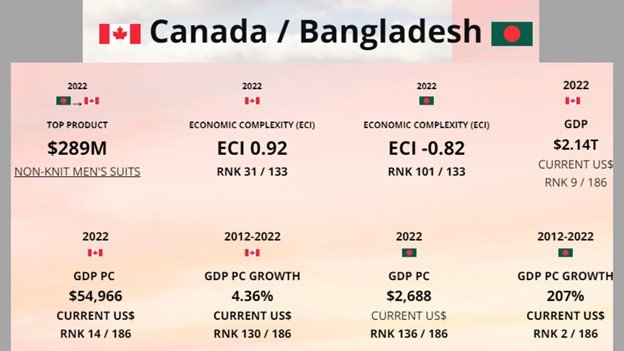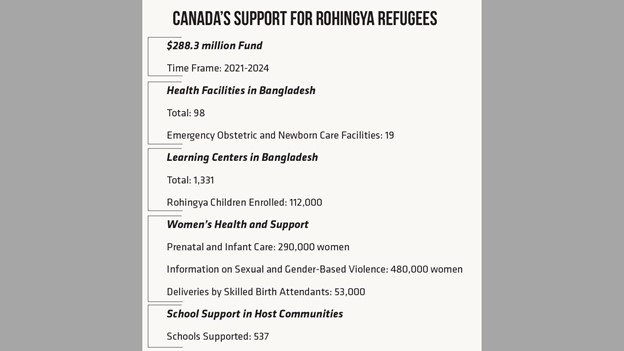With Bangladesh set to graduate from LDC status by 2026, the Foreign Secretary encouraged Canada to leverage Bangladesh’s strategic location, robust economic infrastructure, and favorable policies to enhance trade and investment between the two nations
In a significant acknowledgment of Bangladesh’s remarkable economic journey spanning the past fifteen years, Canadian Deputy Minister of International Development, Christopher MacLennan, highlighted the nation’s progress and expressed Canada’s keenness to adopt a more mature approach in leveraging development assistance to Bangladesh. The Deputy Minister’s remarks came during his maiden official visit to Bangladesh, where he engaged in high-level discussions aimed at strengthening bilateral ties and exploring avenues for enhanced cooperation.
You can also read: Bangladesh Peacekeepers: No Reference of Violating Human Rights
Bangladesh’s imminent graduation from the Least Developed Country (LDC) status presents a unique opportunity to foster a robust economic partnership between the two friendly nations. This transition sets the stage for deeper collaboration across various sectors, paving the way for mutual prosperity and sustainable development.

Bilateral Talks
During his visit, MacLennan held discussions with Foreign Secretary Masud Bin Momen, where both sides expressed mutual commitment to elevating the existing Bangladesh-Canada bilateral relations to a comprehensive partnership. The talks encompassed a wide array of areas including:
- trade
- investment
- educational
- cooperation
- technological innovation
- migration and mobility
- climate change
- cybersecurity
- maritime security
- regional and international issues
The relationship between Bangladesh and Canada is diverse and complex, spanning many sectors and domains that have increased and improved over time.

Canada’s Boosting Trade with Bangladesh
In 2022, Canada exported $1.21 billion worth of goods to Bangladesh, with major products including Potassic Fertilizers, Wheat, and Dried Legumes. Over the past 27 years, Canada’s exports to Bangladesh have seen a steady annualized growth rate of 10.7%.
On the other hand, Bangladesh exported $2.02 billion worth of goods to Canada in 2022, with key products being Non-Knit Men’s Suits, Knit Sweaters, and Non-Knit Women’s Suits. Bangladesh’s exports to Canada have grown at an annualized rate of 11.7% over the same period. Both countries are actively exploring ways to diversify and expand their trade relations, with Canada acknowledging Bangladesh’s impressive economic growth and efforts.

Recent trends indicate promising developments, with Canada exporting C$142 million and importing C$172 million worth of goods from Bangladesh in February 2024. To further enhance Canadian trade and investment in Bangladesh, potential agreements, including a free trade pact and a foreign investment promotion and protection agreement, are anticipated to be signed between Dhaka and Ottawa.
Bangladeshi Students in Canada
Canada is a favored destination for Bangladeshi students who seek higher education abroad. In 2018, more than 6,500 Bangladeshi students studied in Canada, a more than 150% increase from 2014.
To support humanitarian projects in Bangladesh, focusing on education and school facilities, the Alberta government has matched grants. The 2007 cyclone victims also received relief funds from Alberta. Between 2012 and 2016, the average annual imports from Bangladesh to Alberta province were CD$132 million.
Bangladeshi Students in Canada
• 2018: 6,500+
• Increase from 2014: 150%
Alberta’s Support to Bangladesh:
- 2007 Cyclone Relief
- Imports from Bangladesh to Alberta (2012-2016)
- Average Annual: CD $132 million
Exploring Indo-Pacific Cooperation
In line with the growing importance of the Indo-Pacific region, both parties expressed eagerness to explore cooperation under their respective Indo-Pacific Outlook. This signals a shared commitment to regional stability, prosperity, and cooperation in addressing common challenges.
Foreign Secretary Masud Bin Momen commended Canada’s longstanding development cooperation with Bangladesh since its independence in 1971. He highlighted the evolution of Bangladesh-Canada relations beyond traditional development-driven initiatives toward a robust trade partnership in recent decades. With Bangladesh’s impending graduation from LDC status, the Foreign Secretary proposed that Canada leverage Bangladesh’s strategic location, and economic infrastructure, and enable policies to further boost bilateral trade and investment.
Canada’s Efforts for Rohingyas in Bangladesh
Acknowledging Bangladesh’s hospitality in hosting Rohingya refugees, MacLennan expressed appreciation for the nation’s humanitarian efforts. The Foreign Secretary, in turn, conveyed concern over the ongoing situation in Myanmar, which has impeded the repatriation of Rohingya refugees. He thanked the Canadian government for its humanitarian support to the Rohingya population sheltered in Bangladesh and its unwavering political backing towards resolving the Rohingya crisis.

Canada collaborates with the Government of Bangladesh to provide assistance to Rohingya refugees and the affected Bangladeshi communities. The Canadian Rohingya strategy is backed by a substantial fund of $288.3 million allocated from 2021 to 2024.
Canada has consistently advocated for the full implementation of the recommendations put forth by the Advisory Commission on Rakhine State, led by former UN Secretary-General Kofi Annan. These recommendations include granting citizenship rights, ensuring freedom of movement, and facilitating access to essential services for the Rohingya population.
In its efforts so far, Canada’s strategy has significantly supported Bangladesh. It has facilitated the establishment of 98 health facilities, including 19 offering round-the-clock basic emergency obstetric and newborn care. Moreover, 1,331 learning centers have been established for Rohingya refugees and host communities in Bangladesh, with 112,000 Rohingya children enrolled. Prenatal and infant care have been provided to 290,000 women, while 480,000 women have received information on sexual and gender-based violence. Skilled birth attendants have conducted over 53,000 deliveries. Additionally, 537 schools in host communities have received school effectiveness grants to promote gender-equitable education.
Canada’s Support for Bangladesh’s Journey
Bangladesh and Canada engage in fruitful collaboration within international forums, jointly addressing crucial matters such as women’s empowerment, climate change, migration, development assistance, and regional security. Canada deeply values Bangladesh’s significant contributions to regional dynamics, particularly in fostering connectivity, enhancing economic collaboration, and combatting terrorism. Emphasizing its commitment, Canada extends staunch support to Bangladesh’s initiatives aimed at advancing democracy and safeguarding human rights, with particular attention to the rights of minorities, women, and children.
Conclusion
Christopher MacLennan’s visit highlights Canada’s commitment to deepening its engagement with Bangladesh and fostering a comprehensive partnership that transcends traditional boundaries. As both nations look towards the future, the visit sets a promising foundation for enhanced collaboration and mutual prosperity.


